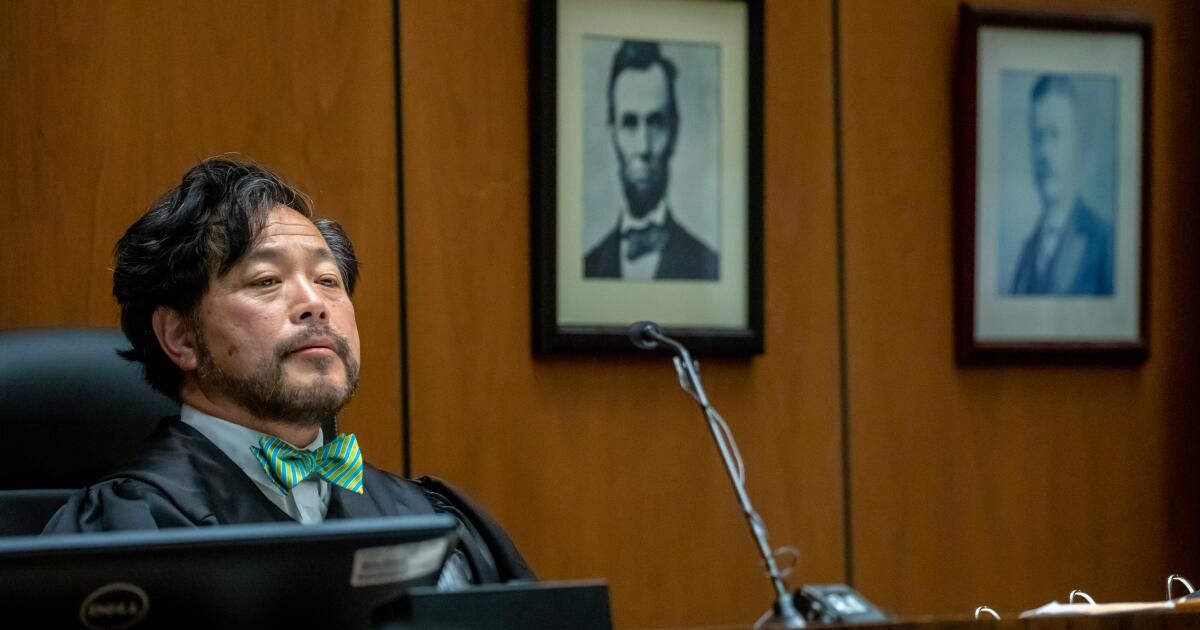Los Angeles County Superior Court Judge Sam Ohta on Tuesday dismissed two of eight remaining felony charges against Diana Teran, a top aide to the district attorney's office accused of illegally using records the state claims were confidential.
But Ohta also ruled that the case will move forward to trial on the remaining six charges. The decision came after a four-day preliminary hearing in the state’s case against Teran, who was charged under a computer hacking statute.
Four months ago, California Attorney General Rob Bonta’s office said Teran broke the law in 2021 when he flagged the names of several sheriff’s deputies for possible inclusion on a list of problem cops. Bonta’s office said Teran knew about those deputies and their alleged misconduct only because of supposedly confidential records he had been sent three years earlier when he worked at the Los Angeles County Sheriff’s Department.
Teran's attorney, James Spertus, has repeatedly said those records were never confidential because they were public court records. But state prosecutors have argued for weeks that all information sent to the Sheriff's Department is considered confidential under department policy, even if it is a public court ruling written by a judge.
Ohta read aloud his 28-page ruling, which took him more than an hour. Ultimately, he concluded that although court records are public, Teran could have searched the names of those deputies in the Sheriff’s Department’s confidential personnel data system after the records in question were emailed to him. Those searches, he said, could show a link between the public records and the confidential information.
State and county prosecutors declined to comment on Tuesday's outcome. But former Los Angeles County District Attorney Gil Garcetti, who watched the proceedings from the hearing, said Ohta's decision was a disappointment.
“It's a sad day when such a fine, ethical and caring lawyer like her was working within the scope of her authority and somehow that scope is criminalised,” he told The Times outside the courtroom.
The hearing, which spanned two weeks, had several moments that raised eyebrows. At one point, a state investigator incorrectly said he thought court records were not considered public records because they cost money. Later, he said all information sent to the Sheriff's Department would be confidential, even a deputy's pizza order receipt.
And while prosecutors said for months that Teran had illegally taken confidential personnel records, testimony showed there was no evidence she had downloaded any of the court records from the confidential personnel files, which she had access to as part of her job. Still, one investigator testified that the state is still looking into additional allegations against Teran.
Throughout the hearing, Ohta repeatedly expressed skepticism about the case, often sighing at state prosecutors or rolling his eyes. At times, he questioned the prosecution's goal, so the outcome seemed like something of a U-turn.
The decision advances a case that sent shockwaves through the state’s legal community when Bonta unexpectedly announced it in April, even as District Attorney George Gascón, a fellow Democrat, was preparing for a tough reelection fight against a more conservative challenger.
Teran’s duties included overseeing the division of the district attorney’s office charged with prosecuting police. She was seen as closely tied to Gascón’s agenda on law enforcement accountability and judicial reform. The district attorney’s office has said it does not comment on personnel matters, but has confirmed that Teran no longer oversees the office’s Ethics and Integrity Operations. Public records obtained by a longtime prosecutor show Teran was still receiving her salary in June.
He The allegations at the heart of the current case date back to 2018, When Teran worked as a constitutional police consultant for then-Sheriff Jim McDonnell, part of her regular duties included accessing confidential officer records and internal affairs investigations.
After leaving the Sheriff's Department in late 2018, Teran joined the district attorney's office, where state prosecutors allege that in 2021, he sent a list of 33 names and supporting documents to another prosecutor for possible inclusion in internal databases of officers with problematic disciplinary histories. According to the 1963 U.S. Supreme Court decision Brady v. Maryland, Prosecutors are required to present any evidence favorable to the defendant, including evidence of police misconduct.
According an affidavit Signed by Tony Baca, a special agent with the state Department of Justice, several of the names Teran emailed to fellow prosecutor Pamela Revel were of officers whose files he had accessed while working at the Sheriff's Department.
After searching news articles and public records requests, a state investigator found that 11 of the names had not been mentioned publicly, leading to the allegation that Teran would not have been able to identify them if not for his special access while working at the Sheriff's Department.
The state has fought for months to keep the arrest affidavit secret and has resisted releasing the officers’ names, seeking protective orders at every turn. When Bonta’s office agreed this year to release the affidavit, prosecutors left nine of the names redacted.
Only the names of Liza Gonzalez and Thomas Negron, former officers who court records show were fired for dishonesty, a move the state has not explained, were made public.
Before the first day of the hearing, Bonta’s office filed an updated version of the criminal complaint, dropping charges related to Gonzalez, Negron and another officer, identified only as Officer Doe 11 in court documents. Prosecutors did not explain why they dropped those three charges, though Spertus later told The Times that one of them — Officer Doe 11 — was a civilian employee and not an officer.
At the beginning of the hearing, the The court heard from Rep. Todd Bernstein, who testified that most Sheriff's Department information is confidential under department policy and that public information, including public court records, would be considered confidential once sent to the department, such as in an email attachment.
Although state prosecutors repeatedly noted that tracking software showed Teran had accessed confidential personnel records hundreds of times while working at the Sheriff's Department, Bernstein testified that the software in fact showed she did not download any files related to the department's 11 employees from the personnel records system.
The court also heard from Baca and another special agent who investigated the case. Much of their testimony focused on identifying the documents Teran is accused of sending to Revel and offering detailed descriptions of the metadata that linked them to files he had received years earlier at the Sheriff's Department.
Testimony showed those files were all court records and interim court orders, echoing claims Spertus had made repeatedly in the past. For months, he has said the supposedly confidential records were all documents from lawsuits filed by officers themselves, seeking to overturn disciplinary decisions and firings.
But Baca acknowledged that while investigators reviewed major news articles and searched Google for public mentions of the officers, he did not check to see if their court records were available on the court website, because he is not “very familiar” with the platform. Also, he said, he did not consider the court’s online records to be public because there is a fee to search them.
“Since you couldn’t find it, does that make it confidential to you?” Spertus asked in response to a broader question about the investigators’ research efforts.
“That’s right,” Baca replied.
In their testimony, the agents also said that some of the deputy district attorneys they had interviewed disagreed with Teran’s view about what materials should be included in the district attorney’s problem cop databases, which they framed as more inclusive than past practices.
The judge frequently bristled at the state’s questions. At one point, Ohta asked whether prosecutors were trying to prove Teran harbored an anti-police bias and demanded to know how that related to the charges. Later, he questioned why they appeared to be trying to prove Teran was supposedly worried about being arrested.
“A lot of people are afraid that the police will arrest them,” Ohta said. “I’m afraid that the police will arrest them.”
When the hearing unexpectedly stretched into its second week, Inspector General Max Huntsman — the county watchdog whose office oversees the Sheriff’s Department — testified that he found Teran “extremely honest” when they worked together. He said that when state investigators interviewed him this year, he told them he was concerned that his prosecution “lacked any legal or factual basis.”
Ohta, however, apparently disagreed. While he agreed with Spertus that court records are public, he said that was not the determining factor in determining whether Teran had broken the law. Instead, he focused on whether the public documents contained names that linked them to confidential personnel records.
Because evidence showed Teran had been tracking some of the deputies' disciplinary cases during her time at the Sheriff's Department, Ohta said it was a reasonable inference that she might have looked up their names in the confidential personnel data system.
He dismissed the two felony charges related to Officers Does 3 and 5, saying there were no emails indicating Teran had been tracking their cases, so there was no “logical inference” that he had looked them up in the personnel records system.
Although Teran had been released on $50,000 bail when she was initially arrested in April, Ohta waived the bail requirement and released her on her own recognizance. She is due back in court on Sept. 3.












